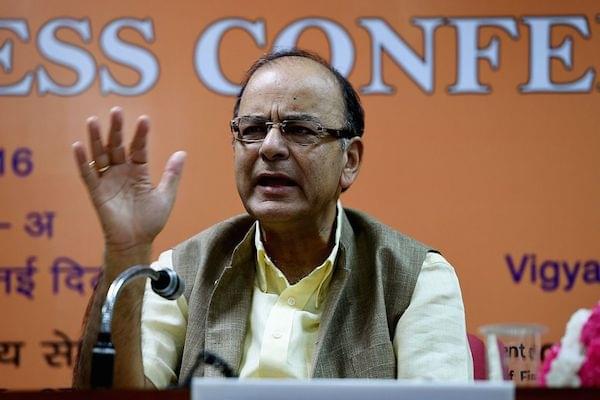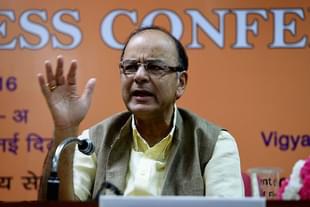Politics
Modi Govt Extends ‘Face Saving’ Olive Branch To Cong On GST
Swarajya Staff
Jul 14, 2016, 03:52 PM | Updated 03:52 PM IST
Save & read from anywhere!
Bookmark stories for easy access on any device or the Swarajya app.


The long-fought battle for the Goods and Services Tax (GST)—the biggest tax reform attempted by the Indian Government—is now closer to fruition than ever. All the states barring Tamil Nadu are on board. They didn’t have any reason to oppose it when their concerns have been addressed by the Finance Minister, who has promised that the industrial states needn’t worry as they will be compensated for any loss in revenue. This will be done fully by the centre for the first three years and partially for another two, if their losses persist.
The only party that has been holding back the tax reform in the Parliament is Congress. The reason is purely political. It is paying the BJP in its own coin, which opposed the GST bill when the roles were reversed until two years ago. Nonetheless, the party has maintained that the BJP must agree to its three demands if it wants its support in the Rajya Sabha. These are:
1) A constitutional cap on the GST rate not higher than 18 percent.
2) Deletion of the provision which allows imposition of one percent tax by additional levy.
3) An independent dispute resolution mechanism.
While the party has shown some signs of compromise on the last two issues in the recent past, it has refused to budge on its demand to ‘ring-fence’ the GST rate by putting a cap in the constitutional amendment bill. However, this is set to change now because the Rajya Sabha arithmetic won’t be in the Congress favour in the upcoming monsoon session as it was in the budget session, thanks to the June elections to the Upper house which saw an increase in the BJP’s strength.
The NDA government with its 72 MPs has the support of another 72 MPs belonging to various non-Congress parties, and 15 nominated and independent MPs. Therefore, it won’t be difficult to scramble the support of required 163 MPs to pass the bill despite the Congress’ opposition. There are only two options left with the Congress now: keep on disrupting the house or help the NDA in passing the GST unanimously. But, to do the latter, it needs a face-saver that would justify their long standing opposition.
It seems that the Modi government, which also wants to pass the GST unanimously, has decided to extend an olive branch to the Congress as a face-saver. The Congress has accepted the government’s invitation of further negotiations. The Finance Minister will meet with the leaders of the Congress in Parliament before the session kicks off on Monday.
The Economic Times reports today (14 July) that the government has come up with a new proposal. It is “mooting the idea of fixing the rate cap in the supporting central GST bill or, in the subordinate rules section of the main bill, saying either can ensure ‘legally ring-fencing of the GST rate’ while providing scope for changing the rate in case of emergencies.”
If the Congress accepts this, it would essentially mean that the GST rate can be changed with a simple majority vote in the Lok Sabha. The Congress proposal would have meant securing two-thirds majority.
This is a compromise as it technically ring-fences the rate but also allows flexibility to change the rate if the need arises in the future. A win-win for both the ruling and the opposition. One only hopes that the Congress would show some maturity and act in the interest of the country by accepting this. The Centre has extended an olive branch to the party to come out of its pessimistic phase. Hope it takes it.





